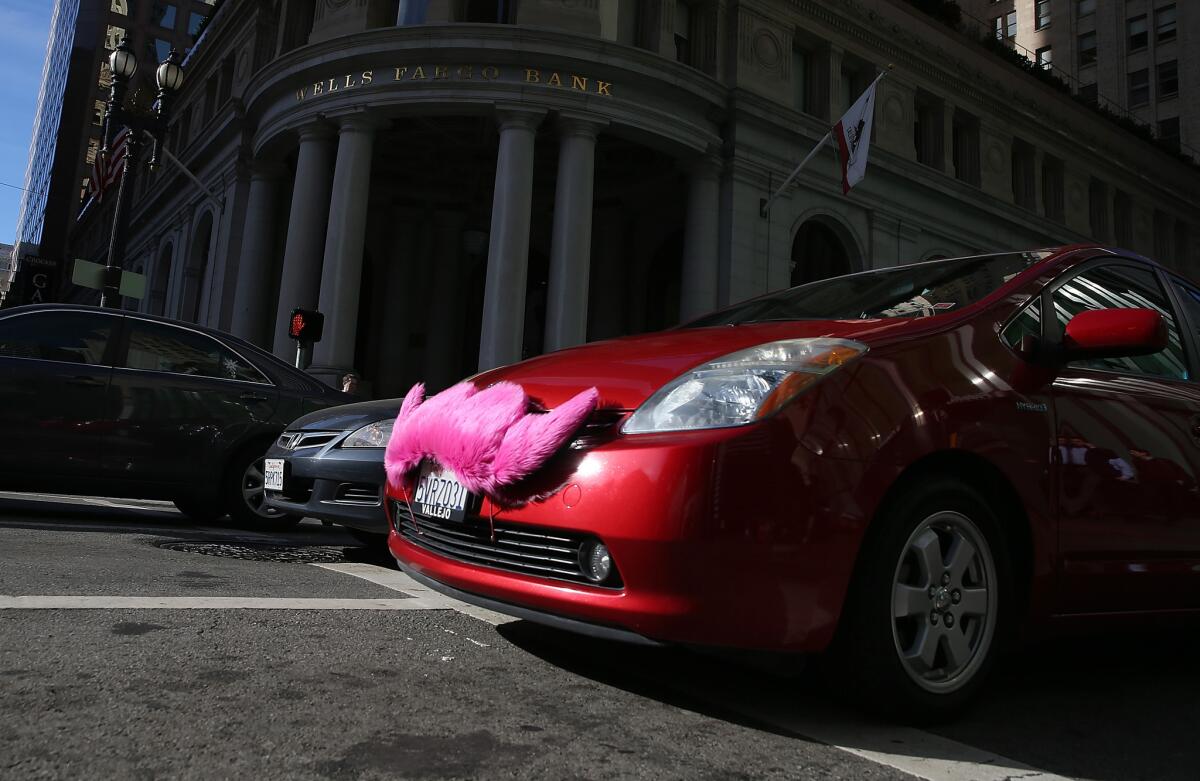Opinion: Lyft expansion: Good for the sharing economy, bad for everyone else

- Share via
Lyft, the ride-sharing service known for the pink furry mustache on its drivers’ cars, is growing. The company expanded into 24 mid-size cities across the country Thursday. It’s great news for the sharing economy. But should we really be celebrating a system that is, in effect, a Band-Aid solution for unemployment and those people struggling financially in post-recession America?
I’m not necessarily opposed to the sharing economy, though I did have a frightening Uber experience with a speeding, texting driver, and personally I’d rather stay in a hotel over an Airbnb home rental, which kind of creeps me out. As Jeremy Rifkin recently wrote in our Op-Ed pages, it’s a “winning economic model” that “will change the course of economic history.”
Using Airbnb as an example, Rifkin attributed the success of sharing services to “near zero marginal cost,” a new phenomenon he says that allows companies to expand without much of a financial investment. “For a traditional hotel chain to add another room to its inventory, the room must be built or acquired, at a significant cost. Airbnb can add another room to its inventory at almost no cost, since its website is already up and running,” he explained.
And for people who have homes to share and rides to give, it allows them to make money during downtime. “Why let your car sit idle in the driveway when you can turn it into a cash machine?” asked Mickey Rapkin in his amusing GQ story, “Uber Cab Confessions.”
The sharing economy may also change how we connect with people -- for the better. As Wired’s Jason Tanz writes: “We are entrusting complete strangers with our most valuable possessions, our personal experiences -- and our very lives. In the process, we are entering a new era of Internet-enabled intimacy.”
Of course, there’s a list of cons too. Among them: It’s bound to hurt the already established industries. Even nonprofit bike sharing puts a dent in bicycle sales.
And what about the workers? Do they really want to be ride-share drivers? People are doing it because they’re desperate. As Daily Intelligencer’s Kevin Roose so perfectly argues:
“A huge precondition for the sharing economy has been a depressed labor market, in which lots of people are trying to fill holes in their income by monetizing their stuff and their labor in creative ways. In many cases, people join the sharing economy because they’ve recently lost a full-time job and are piecing together income from several part-time gigs to replace it. In a few cases, it’s because the pricing structure of the sharing economy made their old jobs less profitable. (Like full-time taxi drivers who have switched to Lyft or Uber.) In almost every case, what compels people to open up their homes and cars to complete strangers is money, not trust.”
ALSO:
The underpaid and too-dangerous lives of Everest’s Sherpa guides
USC student protest: Did the school really have to call their parents?
In Russia, Ukraine crisis is U.S.’s fault: ‘Who is Obama, the czar of the world?’
Follow Alexandra Le Tellier on Twitter @alexletellier and Google+
More to Read
A cure for the common opinion
Get thought-provoking perspectives with our weekly newsletter.
You may occasionally receive promotional content from the Los Angeles Times.











